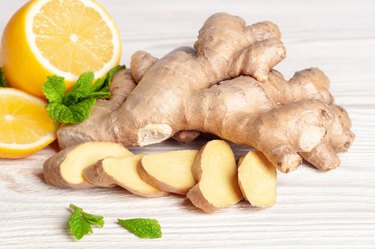
If you have gastroesophageal reflux disease (GERD), the discomfort that follows a meal can disrupt your life. People have tried a variety of tactics for preventing and treating GERD symptoms, and one that frequently garners interest is ginger root, a common herbal remedy.
More About Ginger
Video of the Day
According to the Memorial Sloan Kettering Cancer Center (MSKCC), ginger root has a number of purported medicinal properties. Some studies support its use in preventing nausea and vomiting, for example. However, the National Center for Complementary and Integrative Health notes that almost all of these studies tested ginger as a supplement, not a food, and that ginger's benefit may vary depending on what's causing symptoms.
Video of the Day
MSKCC adds that, while data are lacking, ginger is also touted for:
- Stimulating appetite.
- Relieving indigestion.
- Treating diarrhea.
Beyond digestive ailments, some studies have shown ginger to be helpful in treating arthritis and respiratory ailments, but more studies are needed to confirm any conclusions, MSKCC notes.
As an ingredient in cooking, ginger is used fresh or dried, powdered or whole, in many recipes in a variety of cuisines around the world. Medicinally, the Arthritis Foundation notes that it shows anti-inflammatory and antioxidant activity and it's available in many forms, such as:
- Teas.
- Tinctures.
- Oils.
- Powders.
- Capsules.
Ginger has blood-thinning effects, so Memorial Sloan Kettering advises not taking ginger supplements in the weeks before surgery or if you have a bleeding disorder or are taking certain medications such as blood thinners or nonsteroidal anti-inflammatory drugs (NSAIDs).
Ginger supplements are also not recommended if you have gallstones or are pregnant or breastfeeding, MSKCC notes.
Read more: The Cardiovascular Benefits and Harms of Ginger
Is Ginger Safe With GERD?
Some evidence points to ginger being helpful for heartburn relief, but there's also a lot of evidence to indicate that it's not the best choice. For example, Memorial Sloan Kettering indicates that heartburn is one of the primary potential side effects of ginger use.
"Ginger has anti-inflammatory properties, and studies have shown it to be effective in treating nausea and migraine headaches," says Jeffrey Landsman, MD, a family and geriatric medicine specialist for Mercy Personal Physicians in Lutherville, Maryland. "At this time, however, medical studies have not shown ginger to be effective for GERD."
Dosing impacts aren't well understood, but where ginger might be helpful is in smaller, less medicinal forms, rather than ginger supplements. If you feel the beginnings of heartburn, for example, sipping on a soothing cup of ginger tea may help, according to Johns Hopkins Medicine. The alkaline, anti-inflammatory properties of the tea may help squelch mild irritation before it gets worse.
Other GERD Treatments
If ginger doesn't provide relief for acid reflux and other GERD symptoms, there are plenty of other options to try. Johns Hopkins Medicine notes other home remedies that can help put a stop to mild GERD symptoms include:
- Non-fat milk.
- Lemon water with honey.
- Warm water with a small amount of apple cider vinegar.
Eating watery foods like watermelon, celery, cucumber, lettuce or broth can also help reduce the chances of developing GERD symptoms, Johns Hopkins points out.
There are other simple, practical steps that can help prevent or minimize the risks of GERD symptoms as well, according to the Mayo Clinic. These include avoiding large meals and potential trigger foods like fatty and fried foods, tomato sauces, garlic, onions, alcohol and chocolate. Different people have different triggers, so you'll want to identify and avoid the ones that impact you the most — keeping a food journal that details your reactions to specific foods will help.
Other steps to allay heartburn include avoiding smoking, tight clothing and lying down after a meal. Maintaining a healthy weight or losing weight if needed can also help prevent GERD.
There are several medical options available for GERD if these lifestyle measures don't work, according to the Mayo Clinic. The right treatment for you may vary based on the severity or frequency of your GERD. The typical first line of defense is over-the-counter medications such as antacids, H-2 receptor blockers or proton pump inhibitors.
If the over-the-counter options aren't effective, stronger versions of GERD medications are available with a prescription from your healthcare provider. For individuals with severe GERD symptoms, there are also surgical treatments available to prevent or manage the symptoms of the disease.
Read more: Fruits and Vegetables That Are Safe to Eat With GERD
- Memorial Sloan Kettering Cancer Center: “Ginger”
- Arthritis Foundation: “Health Benefits of Ginger for Arthritis”
- Jeffrey Landsman, MD, family and geriatric medicine specialist, Mercy Personal Physicians, Lutherville, Maryland
- Johns Hopkins Medicine: “GERD Diet: Foods That Help With Acid Reflux (Heartburn)”
- Mayo Clinic: “Home Remedies: Manage Discomfort of Heartburn”
- Mayo Clinic: “Gastroesophageal Reflux Disease (GERD)”
- National Center for Complementary and Integrative Health: "Ginger"
Is this an emergency? If you are experiencing serious medical symptoms, please see the National Library of Medicine’s list of signs you need emergency medical attention or call 911.